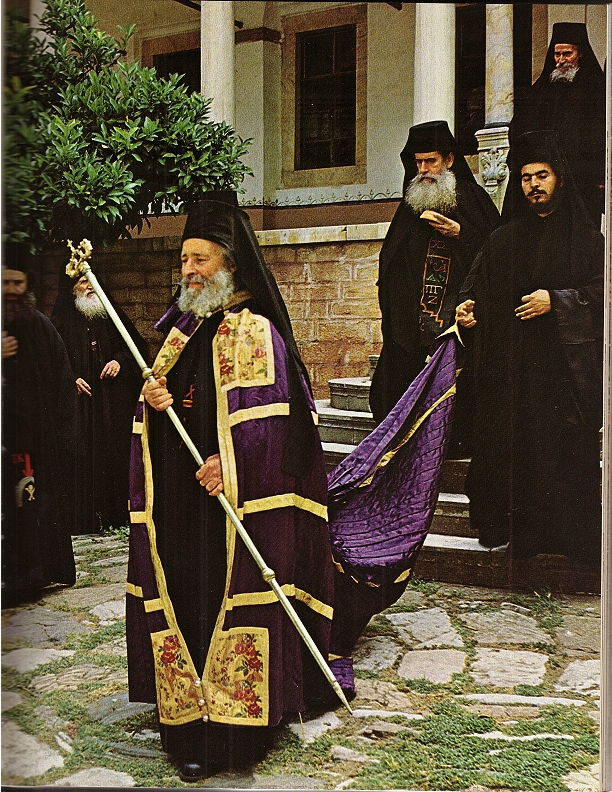| 
Abbot Athanasios 1903-1975 Entered Esphigmenou Monastery 1924
The beloved elder was born in the mountainous Ephesus, in a place called Kerketje, a short distance from the ancient Greek Ephesus, in Asia Minor, in 1903, to George and Vasiliki Karapanagiotou. He was given the name Christos at his holy baptism. His parents and particularly his mother was very virtuous and God fearing. She kept a prayer life, honored the Lord's day and all the Holy days, read the lives of the Saints, kept the church fasts and with pure confession received the Holy Mysteries. She was simple, hospitable, meek and adored her children.
Christos, therefore, imitating his good mother became accustomed to a life of prayer. After a while his childlike joy was to go to a quite area away from home where he would "build" from tree branches a temporary icon stand. Here he would place an icon and would pray with great zeal and perseverance, that he would even forget about eating. His mother seeing his devoutness and piety rejoiced with the idea that one day Christos would become a servant of God. Seeing such good intentions in their son the pious parents prayed continuously to the Lord that his desire would not change.
The young Christos grew up in this environment with piety and modesty, until the common national grief, the bloody and painful times of the destruction of Asia Minor, where the Karapanagiotou family along with other relatives and thousands of Greeks, became refugees and were settled in different parts of Greece. His family settled in Molaous, Lakonia, southeast of Sparta, having with them the double sorrow of being refugees, and the loss of his brother Emmanuel who had been taken prisoner by the Turks.
The holy zeal, however, for a monastic life on Mt. Athos, had begun to flourish within Christos. He did not want to reveal this desire to his family, fearing that it would sadden them at this difficult time in their life. Besides the missing brother Emmanuel there was another brother Frixonas who was mentally challenged.
Christos had fervently made up his mind, about going to Mt. Athos. Because he gave all his wages to his father, and fearing to ask him for money, he decided to start walking towards Nafplio. Here he got on a boat which took him to Piraeus. There he had a joyous meeting. As Christos was boarding the boat for Mt. Athos his brother Emmanuel was disembarking. He along with other Greeks had been set free by the Turks, with the exchange of prisoners and population. "Christos where are you going" asked his brother. Not wanting to reveal his secret desire, he told him that he had come to look for work in Athens. They both returned to their refugee home.
His family learned of his desire to become a monk, and Christos leaves again for the journey to Mt. Athos. He takes a boat to Mt. Athos, but is not allowed to disembark because he did not have the proper papers. He therefore goes to Kavala, where being tired and sad sits down on the stairs near a store and starts weeping.
Unexpectedly a comely youth approaches and asks him why he is crying. Christos tells him of his difficulties and his desire to enter Mt. Athos. "Do not be grieved" the grace filled youth tells him, and hands him 12 drachmas to buy three loaves of bread.
"Do you see Mt. Athos from here? You will walk by the seashore until you arrive there. When it gets dark and you are tired, go to sleep, but always have the sea next to you. This way you will reach Mt. Athos. Go to the first monastery that you see, and there become a monk." When young Christos looked up to see the admirable advisor he saw that he had a bright and sweet appearance.
As the Elder Athanasios would recollect later, this was my guardian angel and guide. The young Christos knew in his heart that this was Divine intervention and with joy was obedient. He bought the three loaves of bread and started his journey. In five and a half days he arrives on Mt. Athos, where compunction overcame him and he continued the journey with tears. He also felt a sweet fragrance that he had never experienced before and which was with him the entire trip. He felt he was in Paradise. Here was Mt. Athos, where monks, equal to the angels dwell and where he had been told were the majestic monasteries, the holy Sketes, the holy Kellia and hesychastic dwelling places where God is worshipped unceasingly and the mystery of the union of man with God is taking place.
He finally arrives at the first monastery by the sea which is Esphigmenou. In front of him he sees the magnificent Byzantine buildings, the castle-like monastery, the church domes, and the gigantic clock which struck 10 in Byzantine time as he entered the monastery on March 1, 1924. |

